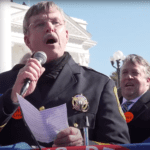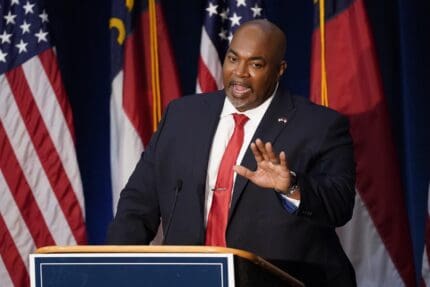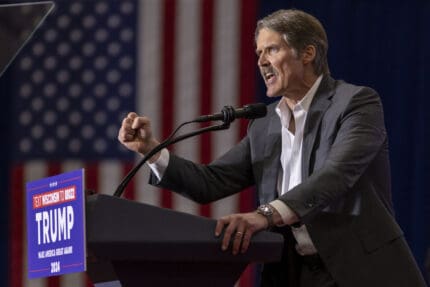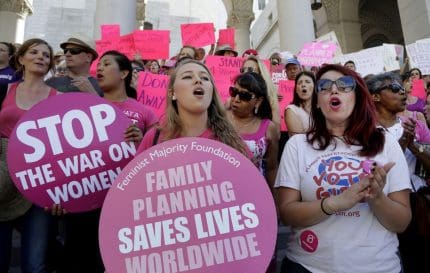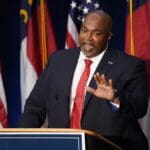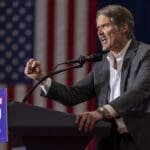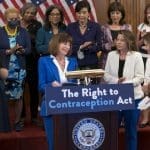Ed Gillespie secretly lobbied for his corporate clients while he worked in the White House
Ed Gillespie, the Republican nominee for governor in Virginia, avoids the word “lobbyist” on the campaign trail. Instead, he employs euphemisms like “when I was in government relations” or “when I did public policy work” when he talks about his shilling for big banks, big tobacco, big energy, and big pharma. Gillespie’s doublespeak is a […]

Instead, he employs euphemisms like “when I was in government relations” or “when I did public policy work” when he talks about his shilling for big banks, big tobacco, big energy, and big pharma. Gillespie’s doublespeak is a transparent attempt to obscure his actual history as a bona fide corporate lobbyist.
But if Gillespie’s work as a lobbyist embarrasses him enough to try to avoid talking about it, his work as White House counselor under George W. Bush is even worse.
An examination of the White House visitor logs reveals several meetings Gillespie took with former clients and colleagues from his previous work on K Street. In October, November, and December of 2007, Gillespie met with representatives from two different firms with which he had prior relationships.
In each case, White House policies bent to their favor.
On Nov. 29, 2007, Gillespie met with a Citigroup lobbyist, Nicholas Calio. (Event Number U56843, White House Visitor And Entry System, November 2007.) Gillespie had been a Citigroup lobbyist just three years earlier.
Eight days after that meeting, Bush announced that regulators and mortgage lenders had reached a deal to provide mortgage interest relief to sub-prime borrowers facing foreclosure. Unfortunately, the so-called “deal” was designed to protect Citigroup and other mortgage lenders, but it did very little to help homeowners facing foreclosure.
Ultimately, the deal didn’t even amount to a band-aid: Wall Street banks nearly collapsed entirely and required massive government intervention to survive.
Gillespie next extended a helping hand to his former client — and one of the nation’s worst polluters — the electric utility Southern Company. On Dec. 5, 2007, Gillespie met with David Ratcliffe, Southern Company’s chairman, president, and CEO. (Event Number U58393, White House Visitor And Entry System, December 2007.) According to the Senate Lobbying Disclosure Database, Ratcliffe’s company had paid Gillespie’s lobbying firm $720,000 from 1997-1999 for his work fighting EPA pollution rules.
Until the day after Gillespie’s meeting with his former client, press reports suggested that Southern Company and the rest of the fossil fuel-based electric utility industry had lost their war against renewable energy standards. Their all-hands-on-deck lobbying campaign had failed to convince the White House to promise a veto of an energy bill that required certain percentages of electricity to be produced by green sources.
The White House expressed dissatisfaction with certain parts of the bill, and in carefully worded communications to Congress, signaled that advisers would recommend a presidential veto, but that is as far as the administration was willing to go. The president refused to issue an actual veto threat.
On Dec. 6, 2007, the day after Gillespie’s meeting with Ratcliffe, the Bush administration suddenly changed its rhetoric. The White House issued a statement threatening a veto of the bill that included the renewable standards. Democrats in the Senate were forced to strip the requirements from the bill before sending it to the White House. As Environment and Energy Daily reported at the time:
The bill cleared Congress only after Senate Democrats last week were forced to jettison two major provisions that had attracted GOP-led filibusters and a White House veto threat. Gone from the bill is a requirement that investor-owned utilities supply 11-15 percent of their power from renewable sources by 2020. Utilities such as Southern Co. and some lawmakers from Southeastern states fought against the measure.
Asked on Thursday about his White House role, Gillespie refused comment:
Recommended

New NC GOP chair flirts with bogus stolen election conspiracies
Simmons predecessor was a staunch 2020 election denier
By Jesse Valentine - April 19, 2024
Texas activists pushed abortion restrictions in NM cities and counties, records show
Emails reveal influence and control in exchange for promises of legal help
By Austin Fisher, Source NM - March 04, 2024
Cannabis workers across Missouri begin push to unionize dispensaries
The first day was a breeze. Sean Shannon and Danny Foster walked into several marijuana dispensaries around Missouri with their matching “Union For Cannabis Workers” shirts and talked to employees about the possibility of unionizing. “The first day, there were 57 stops amongst the teams,” said Shannon, lead organizer with UFCW Local 655, which actually […]
By Rebecca Rivas - December 04, 2023






